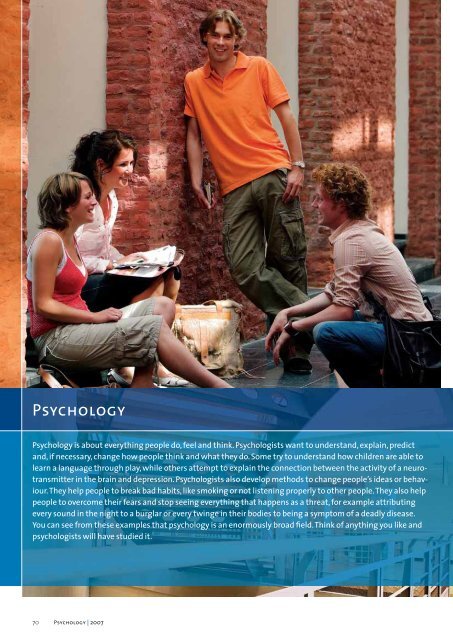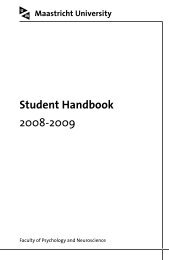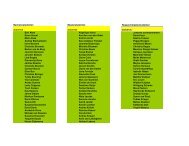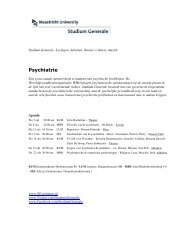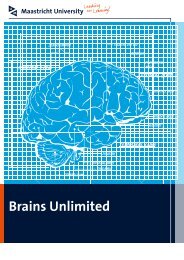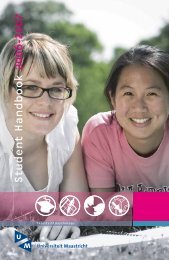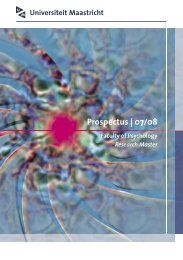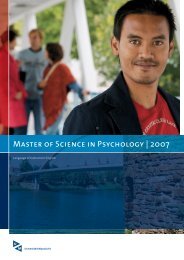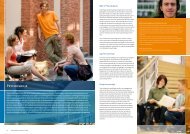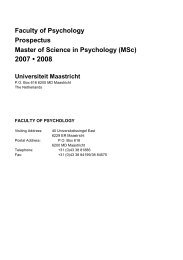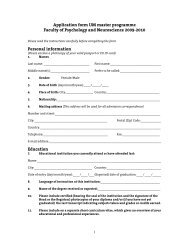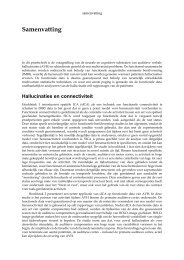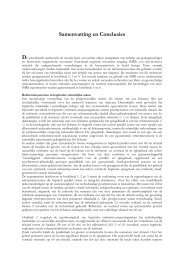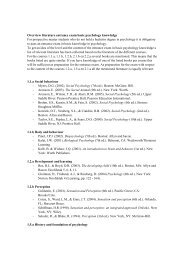Psychology - Faculty of Psychology and Neuroscience - Maastricht ...
Psychology - Faculty of Psychology and Neuroscience - Maastricht ...
Psychology - Faculty of Psychology and Neuroscience - Maastricht ...
Create successful ePaper yourself
Turn your PDF publications into a flip-book with our unique Google optimized e-Paper software.
<strong>Psychology</strong><br />
<strong>Psychology</strong> is about everything people do, feel <strong>and</strong> think. Psychologists want to underst<strong>and</strong>, explain, predict<br />
<strong>and</strong>, if necessary, change how people think <strong>and</strong> what they do. Some try to underst<strong>and</strong> how children are able to<br />
learn a language through play, while others attempt to explain the connection between the activity <strong>of</strong> a neurotransmitter<br />
in the brain <strong>and</strong> depression. Psychologists also develop methods to change people’s ideas or behaviour.<br />
They help people to break bad habits, like smoking or not listening properly to other people. They also help<br />
people to overcome their fears <strong>and</strong> stop seeing everything that happens as a threat, for example attributing<br />
every sound in the night to a burglar or every twinge in their bodies to being a symptom <strong>of</strong> a deadly disease.<br />
You can see from these examples that psychology is an enormously broad field. Think <strong>of</strong> anything you like <strong>and</strong><br />
psychologists will have studied it.<br />
70 <strong>Psychology</strong> | 2007
What is <strong>Psychology</strong>?<br />
Psychologists try to get a grip on human behaviour by<br />
formulating theories <strong>and</strong> then testing them through<br />
research. Because our behaviour is driven by a whole range<br />
<strong>of</strong> factors, there are also many different theories. For<br />
instance, take the fact that working women spend much<br />
more time doing housework than working men. Psychologists<br />
who are primarily concerned with how the genetic<br />
differences between men <strong>and</strong> women may cause them to<br />
think <strong>and</strong> act differently will have different ideas on this<br />
than psychologists who focus on the cultural reasons for<br />
what men <strong>and</strong> women do. Both groups will have very<br />
different ideas based on their own theories about whether<br />
or not the unequal division <strong>of</strong> tasks in the home can become<br />
more balanced.<br />
You can do anything with psychology!<br />
“What I find so interesting about cognitive psychology is that you find out which<br />
developments have led to a theory. Then you realise that nothing is set in stone;<br />
everything is open. It’s the same once you’ve graduated; there are plenty <strong>of</strong> career<br />
opportunities. I’m most interested in how people function in relation to their<br />
environment. People are <strong>of</strong>ten manipulated, by advertisements for example, but they<br />
<strong>of</strong>ten don’t realise it.<br />
If you come to <strong>Maastricht</strong> to study psychology, you’ll get an<br />
introduction to all these different approaches. The distinction<br />
between this <strong>and</strong> other psychology programmes is<br />
that, the further on you get in your programme, there will<br />
be more emphasis on two important approaches, namely<br />
cognitive psychology <strong>and</strong> biological psychology.<br />
Cognitive psychology<br />
It wasn’t difficult for me to choose UM. The psychology programme has a very good<br />
reputation <strong>and</strong> it’s progressive. The lecturers are enthusiastic <strong>and</strong> that comes across in<br />
their teaching. The atmosphere is great. I think the best aspect <strong>of</strong> this programme is that<br />
you meet people who are using psychology in their daily work. Their expertise helps to<br />
prepare you well for the future.”<br />
Bram Amendt, the Netherl<strong>and</strong>s<br />
Third-year <strong>Psychology</strong> student, specialising in Cognitive <strong>Psychology</strong><br />
One <strong>of</strong> the central premises in cognitive psychology is that<br />
our behaviour is not so much caused by the events that<br />
happen around us, but by our interpretation <strong>of</strong> them. It’s not<br />
the creaking branch in the dark forest that causes the lonely<br />
walker to run away in fear, but rather his or her interpretation<br />
<strong>of</strong> the sound. Inexperienced <strong>and</strong> anxious people will be<br />
quicker to attribute the sound to something frightening.<br />
People who are used to the noises <strong>of</strong> a forest will interpret<br />
the sound in another way, which will cause them to react<br />
differently. In other words, between the external impact<br />
(the stimulus) <strong>and</strong> our reaction to it (the response), many<br />
different - <strong>of</strong>ten unconscious - mental processes take place.<br />
These are called cognitive processes.<br />
Biological psychology<br />
Biological psychology assumes that everything we<br />
consciously or unconsciously perceive, do <strong>and</strong> think is due<br />
to patterns <strong>of</strong> activity in the brain. If you consider that our<br />
brains contain more neurons than there are stars in the sky,<br />
it’s clear why the human brain is considered to be the most<br />
complex structure in the world. Various techniques,<br />
including the latest ‘brain-imaging’ techniques, make it<br />
possible to look inside the living brain <strong>and</strong> measure where<br />
activity occurs when you undertake a particular action or<br />
have a certain thought. Such techniques can also measure<br />
the effect <strong>of</strong> the use <strong>of</strong> psychoactive drugs that can change<br />
the way we think, act <strong>and</strong> perceive. Examples <strong>of</strong> these are<br />
tranquillisers that slow down the working <strong>of</strong> the central<br />
nervous system or stimulants like amphetamines <strong>and</strong><br />
caffeine, which activate the central nervous system.<br />
71
The study programme<br />
Behind the scenes in South Africa<br />
“During my study I became more <strong>and</strong> more interested in subjects like consumer<br />
behaviour, human resource management <strong>and</strong> marketing. When it turned out that these<br />
subjects were being taught at Stellenbosch University in South Africa, it didn’t take me<br />
long to make up my mind. In South Africa, some other students <strong>and</strong> I did research into<br />
decision factors in consumer behaviour <strong>and</strong> I also studied some interesting marketing<br />
<strong>and</strong> human resources cases. I lived in a house with twelve international students for<br />
seven months. I worked hard, but there was still time to get a taste <strong>of</strong> life in South Africa.<br />
During the study abroad, you learn how to collaborate with people from different<br />
cultures <strong>and</strong> you see different ways <strong>of</strong> life. The knowledge <strong>and</strong> all the practical experience<br />
I’ve gained will certainly help me in the future. After all, experience abroad always looks<br />
good on your CV.”<br />
Christianne Leenhouts, the Netherl<strong>and</strong>s<br />
Third-year <strong>Psychology</strong> student, specialising in Biological <strong>Psychology</strong><br />
The bachelor’s programme, taught in Dutch, lasts three<br />
years. The first two years <strong>of</strong> the programme <strong>of</strong>fer an<br />
introduction to various topics <strong>and</strong> themes in psychology.<br />
You will explore questions such as: Why do some people<br />
obey authority so easily? Why do teenagers take up smoking<br />
even though they know that smoking is bad for their health?<br />
What is addiction? Why is it that as people get older they<br />
suffer from memory loss? Are the brains <strong>of</strong> schizophrenics<br />
‘different’, <strong>and</strong> is intelligence innate? Apart from courses on<br />
the important psychological themes, there are also courses<br />
where you’ll learn about the methods <strong>and</strong> techniques <strong>of</strong><br />
psychological research.<br />
As well as an introduction to psychology <strong>and</strong> psychological<br />
research methods, training is also given in a number <strong>of</strong><br />
important academic <strong>and</strong> pr<strong>of</strong>essional skills. These include<br />
teaching you how to write an article, how to give a verbal<br />
presentation or a lecture, <strong>and</strong> how to use various discussion<br />
techniques. Attention is also given to programming, putting<br />
together a portfolio <strong>and</strong> keeping it up to date, <strong>and</strong> concep -<br />
tualising <strong>and</strong> carrying out psychological tests. You’ll also<br />
learn how to apply the skills you’ve acquired to set up <strong>and</strong><br />
perform research.<br />
At the end <strong>of</strong> the second year <strong>of</strong> the programme, you will<br />
choose one <strong>of</strong> the two bachelor’s specialisations: Biological<br />
<strong>Psychology</strong> or Cognitive <strong>Psychology</strong>. There is a fixed<br />
programme for each <strong>of</strong> these specialisations at the beginning<br />
<strong>of</strong> the third year. After that, you’ll largely be putting<br />
together your own programme by choosing electives <strong>and</strong><br />
writing your bachelor’s thesis. The electives can be taken in<br />
the <strong>Faculty</strong> <strong>of</strong> <strong>Psychology</strong>, at other faculties at <strong>Maastricht</strong><br />
University, at other universities in the Netherl<strong>and</strong>s, or<br />
abroad. This lets you match your own programme to your<br />
own interests. To finish the bachelor’s programme, every<br />
student has to write a bachelor’s thesis. This individual<br />
end product enables you to show that you are capable <strong>of</strong><br />
applying the knowledge <strong>and</strong> skills you’ve acquired.<br />
Research-minded<br />
The study programme in <strong>Maastricht</strong> focuses attention on research<br />
right from the start. As you progress through the study, the teaching<br />
increasingly links up with the lecturers’ own research. This means<br />
you can be sure <strong>of</strong> having the most up-to-date information,<br />
interested lecturers <strong>and</strong> constant training for academic research.<br />
Just as in the study programme, where biological psychology <strong>and</strong><br />
cognitive psychology form the basis for both the bachelor’s <strong>and</strong><br />
master’s specialisations, the research programme has the same two<br />
central specialisations. This means that teaching <strong>and</strong> research are<br />
fully integrated.<br />
72 <strong>Psychology</strong> | 2007
Honours Programme<br />
The <strong>Faculty</strong> <strong>of</strong> <strong>Psychology</strong>’s Honours Programme is an extra<br />
educational programme for excellent students who want to broaden<br />
<strong>and</strong> deepen their substantive knowledge <strong>and</strong> insight. The programme<br />
starts in the second year <strong>of</strong> the programme <strong>and</strong> lasts for a<br />
year. Bachelor’s students who pass all their first-year subjects <strong>and</strong><br />
who are among the twenty best students in their year (average score<br />
including all <strong>of</strong> the first-year subjects) will be invited to join the<br />
Honours Programme.<br />
After the bachelor’s<br />
Master’s programmes<br />
After you have obtained your bachelor’s degree you can start<br />
a one-year, English-language master’s programme, leading<br />
to a Master <strong>of</strong> Science in <strong>Psychology</strong> (MSc). The <strong>Psychology</strong><br />
<strong>Faculty</strong> at <strong>Maastricht</strong> University <strong>of</strong>fers two specialisations in<br />
the one-year master’s programme: Applied Cognitive<br />
<strong>Psychology</strong> <strong>and</strong> Biological <strong>Psychology</strong>. Both specialisations<br />
have three tracks from which students choose one. About<br />
half <strong>of</strong> each track consists <strong>of</strong> theoretical courses <strong>and</strong> the<br />
other half involves a research internship <strong>and</strong> writing a<br />
master’s thesis.<br />
The Applied Cognitive <strong>Psychology</strong> specialisation includes<br />
the following tracks:<br />
• Experimental Health <strong>Psychology</strong><br />
• <strong>Psychology</strong> <strong>and</strong> Law<br />
• Work <strong>and</strong> Organisational <strong>Psychology</strong><br />
The Biological <strong>Psychology</strong> specialisation includes the<br />
following tracks:<br />
• Neuropsychology<br />
• Developmental <strong>Psychology</strong><br />
• Cognitive <strong>Neuroscience</strong><br />
In addition to the one-year master’s programme, there is<br />
also a two-year research master’s in Biopsychology <strong>and</strong><br />
Psychopathology. This programme has been specially<br />
developed for excellent students who want to pursue a<br />
career in research. Admission to this programme is limited<br />
<strong>and</strong> is by selection.<br />
All <strong>of</strong> the master’s programmes <strong>of</strong>fer further specialisation<br />
that builds on from the third year <strong>of</strong> the bachelor’s programme.<br />
The content <strong>of</strong> the tracks is described in detail in<br />
the masters’ brochure.<br />
Please visit www.unimaas.nl/masters for a complete list <strong>of</strong><br />
the master’s programmes at UM.<br />
73
Efficient programme with a good atmosphere<br />
“<strong>Psychology</strong> in <strong>Maastricht</strong> is the ideal study for me. There’s a pleasant atmosphere in the<br />
faculty, the three-year bachelor’s programme is efficient, <strong>and</strong> the master’s programme<br />
<strong>of</strong>fers a wide range <strong>of</strong> specialisations. The lecturers are knowledgeable <strong>and</strong> enthusiastic,<br />
<strong>and</strong> my fellow students are motivated. There’s always someone, a lecturer or tutor, you<br />
can go to with questions, which is reassuring. The specialisation that interests me most is<br />
Biological <strong>Psychology</strong> <strong>and</strong> especially Neuropsychology. Studying the workings <strong>of</strong> the<br />
mind is a challenge. But I’m also interested in legal <strong>and</strong> forensic psychology, a subject<br />
within the cognitive psychology specialisation. The rest <strong>of</strong> this year should help me to<br />
decide which specialisation to choose.”<br />
Johanna Hauke, Germany<br />
Second-year <strong>Psychology</strong> student<br />
Career opportunities<br />
<strong>Psychology</strong> graduates become involved in a variety <strong>of</strong><br />
activities in many different work situations. You might<br />
become a student advisor, manager, practitioner or<br />
researcher, working in such places as universities, hospitals,<br />
businesses <strong>and</strong> government bodies. You could also set up<br />
your own practice. Psychologists can be found all over the<br />
place: working with the elderly or with young people, in<br />
courts <strong>of</strong> law, sports organisations, or at the workplace.<br />
A distinction is <strong>of</strong>ten made between psychologists who<br />
mainly want to ‘know’ <strong>and</strong> psychologists who mainly want<br />
to ‘help’. The first group mostly conducts fundamental<br />
academic research at universities or other organisations.<br />
They might study the way in which neuro-transmitters<br />
transfer stimuli in the brain or they might conduct research<br />
into the possible relationship between personality traits<br />
(e.g. extraversion, conscientiousness) <strong>and</strong> the success rate at<br />
school, at work or in sports. The answers to their questions<br />
lead to a greater underst<strong>and</strong>ing <strong>of</strong> how people function,<br />
even though the usefulness <strong>of</strong> this knowledge in practical<br />
situations is not always immediately visible. Knowledge<br />
gained from research into a minuscule area <strong>of</strong> the brain, for<br />
example, may only later turn out to lead to the development<br />
<strong>of</strong> a new medicine to prevent dementia.<br />
Psychologists who prefer to ‘help’ rather than to ‘know’<br />
focus on usefulness in practice. They are keen to apply the<br />
knowledge gained during their studies to solving the<br />
problems <strong>of</strong> individuals, groups <strong>and</strong>/or organisations. This<br />
might involve creating <strong>and</strong> implementing examinations<br />
(such as national school exams), giving memory training<br />
courses for the elderly, treating people with eating disorders,<br />
training managers to become leaders, making informative<br />
campaigns to encourage the use <strong>of</strong> condoms, etc.<br />
The descriptions above apply to students who have<br />
completed the Master <strong>of</strong> Science in <strong>Psychology</strong>. We advise<br />
everyone who completes the three-year bachelor’s programme<br />
to go on to take the master’s programme at<br />
<strong>Maastricht</strong> University. You can find more information about<br />
career prospects for graduates in Biological <strong>and</strong> Cognitive<br />
<strong>Psychology</strong> in the master’s brochure.<br />
74 <strong>Psychology</strong> | 2007
International relations<br />
About thirty per cent <strong>of</strong> psychology students take part <strong>of</strong> their<br />
programme abroad, usually their electives. Many foreign students<br />
also come to study in <strong>Maastricht</strong>. Some courses <strong>of</strong>fer tutorial groups<br />
in English especially for these ‘exchange students’.<br />
The <strong>Faculty</strong> <strong>of</strong> <strong>Psychology</strong> has agreements with a number <strong>of</strong> foreign<br />
universities to facilitate student exchanges. These include<br />
universities in Belgium, Germany, France, Great Britain, Italy, Norway,<br />
Pol<strong>and</strong>, Portugal, Spain, Sweden <strong>and</strong> Switzerl<strong>and</strong>. Outside Europe,<br />
exchange agreements have been made with universities in Australia,<br />
Canada, Chile, Costa Rica, Indonesia, Mexico, the United States <strong>and</strong><br />
South Africa.<br />
Mathematics<br />
Students who want to study psychology at <strong>Maastricht</strong> University<br />
must have sufficient prior knowledge <strong>of</strong> mathematics. Students<br />
with a maths deficiency can take a summer or evening course.<br />
Contact the <strong>Faculty</strong> <strong>of</strong> <strong>Psychology</strong>’s PR & Information department<br />
for information about mathematics courses <strong>and</strong> exams.<br />
Numerus fixus<br />
All psychology programmes in the Netherl<strong>and</strong>s, including the<br />
programme in <strong>Maastricht</strong>, have asked for a numerus fixus, or a<br />
maximum number <strong>of</strong> students, for the 2006-2007 academic year<br />
The numerus fixus has not been requested because <strong>of</strong> a fear that<br />
there will be too few places available in each programme, but is<br />
intended to more evenly distribute those interested in psychology<br />
over the various programmes. Since all <strong>of</strong> the programmes have set a<br />
high upper limit, the expectation is that everyone who applies in<br />
good time will be given a place <strong>of</strong> their choice.<br />
Admissions<br />
Dutch diploma<br />
• Final VWO diploma, ‘new style’; all pr<strong>of</strong>iles.<br />
• Final VWO diploma, ‘old style’ (gymnasium or atheneum); with maths A or B.<br />
• Bachelor’s degree or HBO propedeuse; it is advisable to do an extra mathematics<br />
course before you start the bachelor’s programme.<br />
Belgian diploma<br />
• Secondary school diploma; i.e. ASO, KSO, TSO or BSO (BSO only if the seventh<br />
year has been taken as ‘doorstroming’).<br />
• A different Flemish diploma <strong>of</strong> at least a similar level; a relevant HOBU course<br />
you have completed or for which you have unconditionally moved up to the<br />
second year.<br />
German diploma<br />
• Zeugnis der Allgemeinen Hochschulreife (Abitur), plus a certificate for level II<br />
<strong>of</strong> the NT2 exam (‘Nederl<strong>and</strong>s als tweede taal’ national Dutch exam) or an ITN<br />
certificate (‘Interuniversitair Toelatingsexamen Nederl<strong>and</strong>s’ university<br />
admissions exam).<br />
You can find more information about NT2 or ITN on our website:<br />
www.psychology.unimaas.nl<br />
Other Non-Dutch diplomas<br />
• Colloquium doctum, admissions exam for people age 21 or over (see<br />
www.psychology.unimaas.nl for more information).<br />
• Prospective students whose native language is not Dutch must have a<br />
certificate for level II <strong>of</strong> the NT2 exam (‘Nederl<strong>and</strong>s als tweede taal’ national<br />
Dutch exam) or an ITN certificate (‘Interuniversitair Toelatingsexamen<br />
Nederl<strong>and</strong>s’ university admissions exam).<br />
• More details for prospective students with diplomas other than those<br />
described above can be found by visiting www.unimaas.nl > Prospective<br />
bachelor’s students > Admissions.<br />
At the time this brochure went to press, it was not yet clear whether<br />
a numerus fixus would apply to the 2007-2008 academic year.<br />
As soon as a decision has been made, it will be published at<br />
www.psychology.unimaas.nl<br />
You can find more information on exemptions at www.psychology.unimaas.nl<br />
Application <strong>and</strong> registration<br />
Information about the application <strong>and</strong> admissions procedures can be found on<br />
pages 82-83 <strong>of</strong> this brochure <strong>and</strong> on www.unimaas.nl > Prospective bachelor’s<br />
students > Admissions.<br />
Contact information<br />
PR & Information<br />
<strong>Faculty</strong> <strong>of</strong> <strong>Psychology</strong><br />
<strong>Maastricht</strong> University<br />
P.O. Box 616<br />
6200 MD <strong>Maastricht</strong><br />
The Netherl<strong>and</strong>s<br />
Phone: +31 43 388 2209 / 1871<br />
E-mail: bachelorinfo@psychology.unimaas.nl<br />
Internet: www.psychology.unimaas.nl<br />
75


